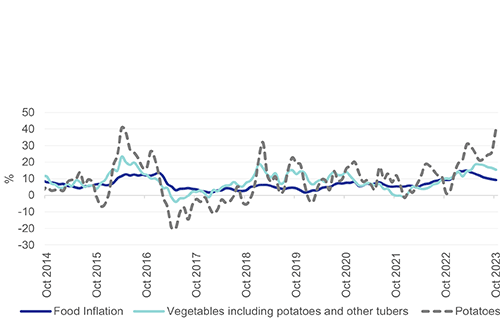Domestic inflation is expected to moderate in the short to medium-term, mainly due to an expected decrease in fuel prices. Due to this factor, local stock brokerage Simonis Storm (SS) maintains its view of inflation to average at 5.9% in 2023.
This forecast is being made after a domestic inflation rate of 6% year-on-year (y/y) in October 2023, which SS stated was influenced by factors like food prices, particularly vegetables and potatoes, and a notable increase in the transport category due to higher fuel costs. The October inflation figure marks an increase from the 5.4% y/y rate recorded in September 2023, and is the third consecutive increase since the 4.5% y/y deceleration observed in July 2023.
“While the category of food and non-alcoholic beverages continues to be the primary contributor to headline inflation, the transport category took the lead,” SS stated.
In their latest inflation report, they also noted that global events, such as floods in Libya and the Hamas-Israel conflict, impacted fuel prices. SS pointed out that expectations suggest a potential easing of fuel prices for the rest of the year, supported by the strong rand and the US Federal Reserve’s rate hike decision.
“Notably, in South Africa, fuel prices have been cut for November, and it is anticipated that December will see fuel price cuts too due to lower international oil prices. The rand, presently at about USD/ZAR18.60, is stronger than in October, but slightly weaker than its recent peak. Global factors such as increasing US crude oil stockpiles and weak global growth, contribute to the expectation of lower inflation in 2024. However, risks persist, including those from weather events and global uncertainties,” SS stated. The stock brokerage further noted that the monthly inflation rate for October 2023 remained stable, with the same rate as the 0.8% month-on-month (m/m) rate reported in September 2023.
The FAO (Food and Agriculture Organisation) Food Price Index dropped slightly to 120.6 points (0.5% m/m drop) in October 2023. According to SS, this was mainly due to lower prices for sugar, cereals, vegetable oils and meat, with dairy product prices rising. Wheat prices also fell due to increased supplies in the United States of America, while coarse grain prices increased because of reduced maize supplies in Argentina.
“Rice prices declined due to weak global import demand, while vegetable oil prices decreased, particularly palm oil, and milk powder prices rose due to higher import demand and supply constraints in Europe. Pig meat prices continued to fall, and poultry rebounded due to avian influenza outbreaks and strong consumer demand. Sugar prices decreased because of increased production in Brazil, a weaker Brazilian currency, and lower ethanol prices, although concerns about supply constraints limited the drop,” SS stated.
On the domestic front, the food and non-alcoholic beverages’ category, which accounts for 16.5% of the National Consumer Price Index (NCPI) basket, experienced an annual inflation rate of 9.4% y/y in October 2023, which is an increase from the 9.1% y/y recorded in October 2022, but a slowdown from 9.8% y/y recorded last month.
In its inflation report, SS stated that Namibia imports approximately 4 000 tonnes of potatoes each month due to challenges faced by local potato production, especially during the hot summer months when cultivation is difficult. As a result, during October 2023, the borders were fully opened for potato imports, allowing traders to bring in 90% of potatoes, primarily from South Africa.
“Winter, being the preferred season for cultivation, further adds to the high demand and limited supply, following the conventional economic principle: the scarcer the commodity, the higher its price,” SS continued.
Meanwhile, the annual inflation rate for the transport category in October 2023 stood at 6.6% y/y, representing a significant slowdown from the 17.8% y/y recorded in October 2022, but an increase from the 2.2% y/y recorded in September 2023.
“This increase is primarily attributed to the operation of personal transport equipment category, which stood at 7.5% y/y in October 2023. This marks a noteworthy deceleration from the 26.8% y/y recorded in October 2022, but is an increase from the 0.1% y/y recorded last month. The surge in the inflation rate for the category can be attributed to the rise in petrol and diesel prices, as announced by the Ministry of Mines and Energy”.
Following the outbreak of the Hamas-Israel conflict in early October, oil prices surged, causing concerns about potential increases in fuel prices and inflation.
“For the remainder of the year, it is expected that fuel prices will ease, supported by the relatively strong position of the rand. The rand’s strength was further boosted by the news that the US Federal Reserve would not raise interest rates, which calmed markets and contributed to a more positive sentiment,” SS explained.



